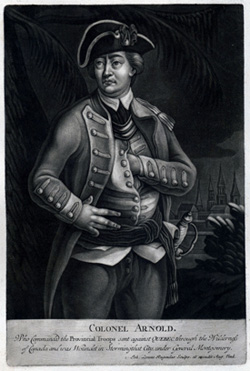Benedict Arnold (1741-1801)

Perhaps the most infamous military figure of the Revolution, Benedict Arnold's defection to the British in 1780 has obscured his early importance to American battlefield success. Born in Norwich, Connecticut, in 1741, and apprenticed to an apothecary, Arnold became a successful merchant after establishing a business in New Haven in 1762. While trading mainly with Canada and the West Indies, Arnold was suspected of smuggling and having engaged in at least two duels during sea voyages to the West Indies. In 1767 he married Margaret Mansfield, the daughter of New Haven's sheriff.
A member of the Sons of Liberty from 1766, Arnold was an early and enthusiastic supporter of the patriot cause. He was elected captain of the New Haven militia in 1774, and when news reached him of the battles of Lexington and Concord in April 1775 he immediately marched his men, without orders, to Boston. His familiarity with the weakness of Canada's defenses then led to a plan to capture Fort Ticonderoga and nearby Crown Point, along with its critical artillery. He and Ethan Allen captured the fort in May 1775. His wife's death later that year compelled his return to Boston, where he gained the trust and appreciation of George Washington.
With Washington's support, Arnold gained command of an attack on Quebec. After leading his men through a nightmarish march, he joined with forces under Richard Montgomery to assault the city at the end of December 1775. Arnold was severely wounded and Montgomery killed in the failed attack. Promoted to brigadier general by the Continental Congress, Arnold organized a small fleet to halt the October 1776 British advance into New York. Arnold's fleet held off the larger British flotilla long enough to buy the Americans much needed time, as an invasion from Canada at that time could well have doomed the Patriot cause given how badly the war was then going for Washington's army in New York. Arnold displayed more heroism in May 1777 while leading a band of militiamen to thwart a major British raid on the Connecticut coast, and Congress promoted him to major general, although without the seniority over other general officers that both he and Washington felt he deserved.
Arnold was then sent to the northern army under Horatio Gates, which was preparing to face another British invasion from Canada. Perhaps influenced by Arnold's later actions and the self-aggrandizing reports of Gates, historians have disagreed about Arnold's role in the pivotal Saratoga campaign and the extent of his contribution to the final victory over British commander John Burgoyne. Looking closely at the events of August and September 1777 there can be little doubt that victory at Saratoga would have been impossible without Arnold. His persistent and daring attacks on Burgoyne's forces halted the British advance time and again, giving Gates the chance to mount an effective defensive posture. In Arnold's last dramatic (and unauthorized) assault on Burgoyne, his left leg was shattered and he ended up in an Albany hospital while Gates claimed sole credit for Burgoyne's defeat; Burgoyne, however, blamed Arnold. The surrender of a major British army gave France enough confidence in American success to move forward with an open alliance.
Arnold's next post was the beginning of his end. Appointed military governor of Philadelphia, Arnold actively associated with the loyalist families who supported the British occupation and there married 19-year-old Margaret (Peggy) Shippen, a member of a loyalist family (and the first cousin of one of Virginia's most prominent families, Mary Willing Byrd, the wife of William Byrd III). Arnold was accused by enemies of using his post to enrich himself. Congress directed charges to Washington to be used in a court-martial. At the same time, Arnold made his first contact with the British command, offering his services using the codename Monk—a clear reference to the Parliamentary hero of the English Civil Wars who secured Charles II's restoration on terms that protected the English constitution.
Arnold was embittered by what he perceived as mistreatment by Congress, disrespect from fellow officers, and, according to his later apologia, the evaporation of his support for the American cause after the alliance with France. He provided the British with information for more than a year. Then, in 1780, he attempted to deliver to them his new command, West Point, and its garrison, for £20,000. The plan failed but Arnold escaped to British lines and was rewarded with a commission as a brigadier general, a payment of more than £6000, and a pension of £360 per year for life. His treason was a personal blow to Washington and a public blow to the nation.
In command of British and loyalist troops for the last two years of offensive operations in the war, Arnold led successful raids in Virginia and Connecticut. After the surrender at Yorktown in October 1781, Arnold, his wife, and children settled in London. His final years were ones of disappointment as one venture after another failed. Depressed and financially ruined, he died at his home in London on June 14th, 1801.






